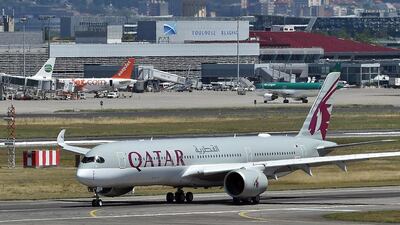As the crisis over Qatar continues to escalate, Arabic-language commentator Emile Ameen talks about Doha’s unprecedented dualism.
“Qatar’s foreign minister [Mohammed bin Abdulrahman Al Thani] has told Agence France-Presse that his country was willing to listen to the nations that have severed relations with it.
“However, he has hired an American public-relations agency, led by John Ashcroft, the former attorney general who served the government of George W Bush and promoted the idea that Qatar refuses to bend,” Ameen wrote in Aletihad, the Arabic-language sister publication of The National.
According to the writer, the American firm was not chosen at random.
“Mr Ashcroft is a neo-conservative representing the extreme right in American politics, hence his hostility towards Arabs and Muslims and his clear stance vis-a-vis Saudi Arabia and other Gulf countries.”
Ameen commented that the last statement of Qatar’s foreign minister was riddled with controversy and dualities.
“The Qatari foreign minister defends his country in connection with its dealings with the Muslim Brotherhood when it was in power in Egypt.
“However, he overlooks the fact that the Brotherhood was removed from power four years ago.
“Meanwhile, Qatar continues to nurture elements that scheme and plot against Egypt and its people,” the writer said. But the patience of Arab and other countries is wearing thin.
“No one will accept Qatar’s strategic obstinacy or ethical dualism.
“What is happening all the way from Washington to London, passing through Cairo, Abu Dhabi and Riyadh shows that other scenarios have been drawn up to starve the monster.
“From international political and diplomatic sanctions and penalties imposed on the ‘banks of evil’ that were caught sending US$50 million [Dh1.8 billion] monthly to terrorists in Syria and Iraq to cutting weapons supply to Qatar and the general boycott, the siege is becoming a reality.”
Ameen warned of tougher times ahead for Qatar if it continued to misbehave.
Writing in the London-based pan-Arab newspaper Asharq Al Awsat, the columnist Mohammed Al Rumaihi quoted Sheikh Sabah Al Sabah, the emir of Kuwait, who expressed hope that the crisis would not lead to further consequences.
According to Al Rumaihi, crises follow one rule: “They unveil obvious truths, but also assumed truths that were not so obvious.”
Rather than leaving such truths hidden, the writer said it would be better to face them. “And the Gulf crisis is no exception, albeit having a greater impact.”
Al Rumaihi said many people were confused and afraid as crisis engulfed the region.
“They hoped it would be resolved peacefully and amicably. That would only strengthen the region and prevent it from falling into an abyss.”
In the event of Kuwait’s successful mediation in the Qatar rift, he predicted that there would be only winners. And the only winner would be “the Gulf community that has always stood together”.
This in turn would bring stability to the region.
On the other hand, Al Rumaihi argued that the crisis should not be internationalised or regionalised. “Rather, its resolution should be confined to the concerned countries.”
The writer concluded that the current crisis calls for talks to restructure the GCC Council such as to institutionalise it and improve its effectiveness.
“They say that crises create opportunities; perhaps this crisis will be a chance for developing the GCC, creating an effective channel for dialogue and finding means to address fears and concerns of member states with honesty and objectivity.”
* Jennifer Attieh
translation@thenational.ae

